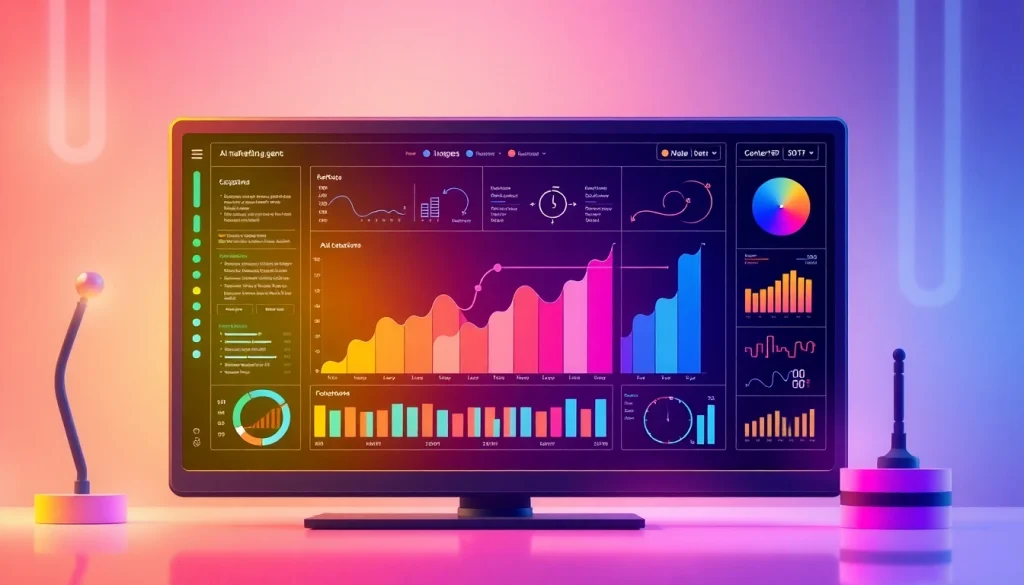
Understanding AI Marketing Agents
The landscape of marketing is evolving rapidly, and at the forefront of this transformation are AI marketing agents. These sophisticated software solutions leverage artificial intelligence to automate various marketing tasks, blending automation with human oversight to optimize marketing strategies. In this article, we will dive deep into the mechanics of AI marketing agents, their benefits, implementation strategies, challenges, and the future trends shaping this exciting field.
What Are AI Marketing Agents?
AI marketing agents are tools or software that utilize artificial intelligence technologies to carry out specific marketing tasks. Unlike traditional marketing agents that require human involvement for everything, AI agents operate with a certain degree of autonomy, performing functions such as content creation, data analysis, and customer engagement without constant supervision. They can analyze consumer behavior, forecast trends, and optimize campaigns in real time, leading to better-targeted marketing efforts.
How Do They Work?
The functioning of AI marketing agents revolves around several complex algorithms and machine learning processes. By ingesting vast amounts of data—from customer interactions to market trends—they employ predictive analytics to identify patterns and insights that a human marketer might overlook. Here are the core components of how they operate:
- Data Collection: AI marketing agents aggregate and analyze data from various sources, including social media platforms, customer feedback, and web analytics.
- Machine Learning: They use machine learning models to learn from past interactions and improve their responses over time, enabling them to deliver increasingly personalized messages.
- Automation: Once a specific dataset has been analyzed, AI agents can automate tasks like email campaigns, social media posting, and performance reporting without continual input from a human operator.
Key Features and Capabilities
The strength of AI marketing agents lies in their diverse functionalities. Some key features include:
- Customer Segmentation: AI agents can segment customers based on behavior and preferences, enabling more targeted marketing efforts.
- Predictive Analytics: By forecasting future buying behaviors, AI agents help marketers allocate resources more effectively.
- Personalization: These tools create individualized interactions with customers, enhancing their experience and engagement.
- Campaign Optimization: AI agents can test different strategies and adjust campaigns in real-time based on performance data.
Benefits of Utilizing AI Marketing Agents
Numerous organizations are transforming their marketing operations by integrating AI marketing agents. The advantages extend beyond mere automation and encompass a variety of efficiencies and enhancements.
Increased Efficiency in Campaign Management
AI marketing agents streamline campaign management by handling routine tasks efficiently. For instance, automation of repetitive processes like A/B testing, email marketing, and report generation frees up human marketers to focus on strategic initiatives. This not only saves time but significantly reduces operational costs.
Enhanced Customer Targeting and Segmentation
Through advanced analytics, AI marketing agents can identify distinct customer segments and tailor campaigns to specific demographics or behavioral characteristics. This capability leads to higher conversion rates because the marketing messages resonate more effectively with the audience. For example, a fashion retailer leveraging AI can use past purchase data to target specific ads toward users who have shown interest in particular brands or styles.
Real-Time Data Insights and Analytics
AI marketing agents provide real-time insights that help businesses adjust their strategies on the fly. With access to analytics dashboards, marketers can immediately see which campaigns are performing well and which aren’t, allowing quick pivoting to improve results. This data-driven approach ensures maximum efficiency and effectiveness of marketing campaigns.
Implementing AI Marketing Agents in Your Strategy
Incorporating AI marketing agents into your marketing strategy requires careful planning and execution. Here are critical steps to ensure successful implementation.
Choosing the Right Platform for Your Business
Selecting the appropriate platform is crucial. Business owners need to evaluate their specific needs, budget, and existing technology stack. Popular AI marketing tools like Salesforce, HubSpot, and Marketo offer various functionalities tailored to different business sizes and needs. Conducting a thorough comparison of features will help in making an informed decision.
Integrating AI Solutions with Existing Tools
The transition to AI-driven marketing doesn’t mean abandoning existing systems. It’s essential to integrate AI solutions with CRM systems, analytics tools, and other marketing platforms to create a cohesive marketing environment. This integration allows for seamless data flow and comprehensive insights, enhancing decision-making processes.
Measuring Performance and Adjusting Strategies
Once implemented, it’s vital to establish metrics and KPIs to measure the performance of AI marketing agents. Regularly analyze these indicators to identify areas for improvement. Metrics such as conversion rates, customer engagement, cost per acquisition, and ROI will provide insights into the effectiveness of AI strategies, allowing necessary adjustments.
Common Challenges and Considerations
While the advantages of AI marketing agents are plentiful, challenges do exist. Being aware of these potential pitfalls can help in proactive risk management.
Overcoming Resistance to AI Adoption
One major hurdle in implementing AI marketing agents is overcoming organizational resistance. Employees may fear job displacement or feel unprepared to adapt to new technology. It’s essential to provide education and training about the role of AI in enhancing their work efficiency rather than replacing them. Developing a culture that embraces technology as a partner will ease concerns and facilitate smoother transitions.
Ensuring Data Privacy and Compliance
With increased reliance on data, marketers must ensure compliance with data privacy regulations, such as GDPR and CCPA. Transparency in data collection and usage practices is vital for building customer trust. Organizations should work closely with legal teams to ensure they are compliant while leveraging AI advantages.
Continuous Learning and Adaptation Needs
The digital landscape is continually evolving, and so are consumer preferences. AI marketing agents must continually learn and adapt to these changes, necessitating regular updates and retraining of algorithms. Businesses should foster environments where continuous learning is prioritized, thus ensuring that their AI tools remain relevant and effective.
The Future of Marketing with AI Agents
As we look to the future, the potential for AI marketing agents to reshape the industry is immense. Various trends are emerging that will define the next phase of marketing technology.
Trends in AI Marketing Technology
We are seeing trends such as increased personalization, voice search optimization, and AI-driven content creation gaining momentum. These features enhance user experiences and elevate marketing effectiveness. Technologies like natural language processing (NLP) will allow for even more sophisticated customer interactions, making chatbots and virtual assistants more capable and human-like.
Predictions for AI Agent Market Growth
Data suggests that the AI marketing market is on a trajectory for substantial growth. By 2028, AI in marketing is projected to reach over $107.5 billion, demonstrating the sector’s escalating reliance on AI solutions. This growth invites more innovation and competition within the industry, ultimately benefiting consumers through enhanced services.
Long-Term Benefits: Sustainability and Innovation
AI marketing agents will not only improve immediate marketing efficiency but also contribute to long-term sustainability and growth by fostering enhanced customer loyalty, brand reputation, and ongoing innovation. As businesses learn through AI, they can develop more sustainable practices that benefit the environment and society at large.






